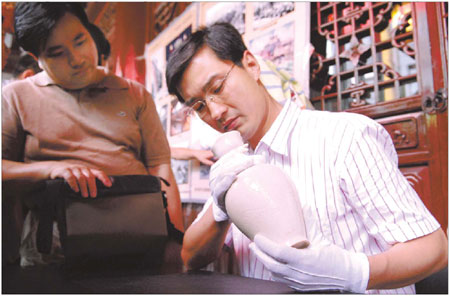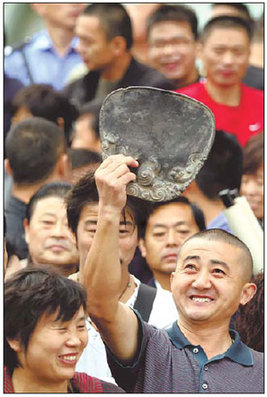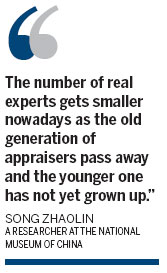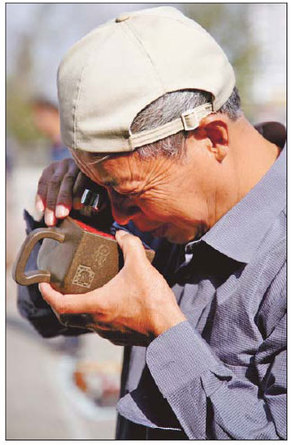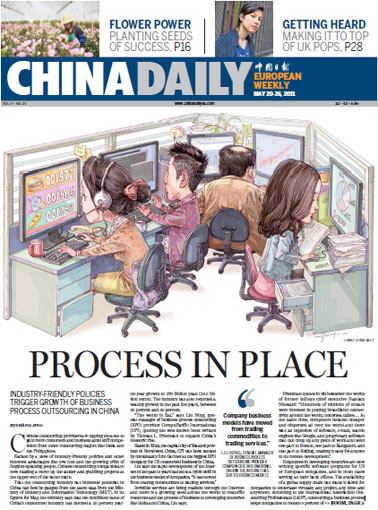Society
Antique buyers fall for old tricks
Updated: 2011-05-27 07:25
By Zhang Yuchen (China Daily)
|
|
Ding and his colleagues looked over the item and broke the news: The pot was counterfeit. The woman had no chance of recovering the 20,000 yuan appraisal fee she paid to the "expert" in the capital.
"She fell onto the chair and sat there, fixed, when she heard the 'antique' was a fake," Ding said. "I felt so sorry..."
More than 1 million items have been submitted to Ding and his colleagues for review at the institute over the last two years. The institute is the only organization in the province entitled to conduct forensic appraisals, which are used for court proceedings.
"We could only guarantee 61 items of those submitted and we handed out credentials to the owners," Ding said.
China's legitimate art and relics market is thriving. Last year it overtook the United Kingdom's to become the second largest market worldwide, according to an annual report by the European Fine Arts Foundation. Its value doubled from 2009, reaching 9.8 billion euros (91.2 billion yuan, $14 billion) and a 23 percent global share, the foundation said.
The counterfeit market is booming, too. According to a recent report from Beijing Business Today, about 300,000 people work in China's fake antiques market, which generated more than 10 billion yuan in 2009 and 2010.
Common people still dream of making a fortune by buying and selling true relics, but there is little help available to guide and protect them.
|
|
Who is qualified?
Investing in antiques, like investing in real estate, has swept the country in the past 10 years as a means of accumulating wealth. But it works only if the investment is well placed. That requires expert appraisal, which can be hard to find.
In China, the people who are consulted to appraise antiques generally fall into four groups: museum researchers who have been absorbed in their fields for decades, other employees of well-regarded museums, professors in archaeology academies and people who work in antique stores.
Song Zhaolin, a researcher at the National Museum of China, puts his faith only in the first group, his own. Through his experience in research, he values the years of familiarity with genuine collections.
A 70-year-old who researched and repaired relics for years at a different museum cautioned that working for a museum does not necessarily qualify people for appraisals. "They may brag they are working in a famous place, but their real jobs may only cover repairing the plumbing," said the man, who would not let his name be used.
Archaeology professors are well trained to recognize and safeguard ancient relics, but may not be familiar with the current market or setting monetary values.
China's Cultural Market Development Center used to provide consultations on antiques, but in April it canceled all appraisal services for individual collectors. It gave no explanation.
The China Association of Collectors connects people who share an interest in collecting, but it does not provide appraisal services to the public, an association officer told China Daily.
Local cultural departments make judgments about items in terms of how they can be shipped abroad, but that is only for customs purposes.
Some antique auction firms have their own appraisers or hire specialists they are familiar with to judge whether items are genuine. In that sense they are not independent appraisers, but the works they are valuing generally are intended for sale at auction. These specialists may or may not also evaluate items for individuals.
Yang Ziming, the principal appraiser at Ji Gu Relics Evaluation Center in the Liulichang Cultural Relics Street, charges 50 to 100 yuan for an oral evaluation, a lower rate than others posted at nearby shops. He said he can help a customer find appraisers with much more experience and fees to match, about 20,000 yuan.
Down the street, Wang Yunrong, an appraiser at Beijing Aoya Technological and Trade Co, told China Daily he can verify the genuineness of jade, Chinese water paintings, porcelains, coins and other items. So can the other two appraisers he works with, he said.
|
|
In his shop, he said, "Every one of us has abundant knowledge about all fields."
Song, the National Museum researcher, views expertise differently. A true expert has general knowledge about many spheres of his field, he said, but specializes in just one or two.
"The number of real experts gets smaller nowadays as the old generation of appraisers pass away and the younger one has not yet grown up," Song said.
Official credential
In 2005, for the first time, China began to promote arts and relics appraiser as a profession and to regulate the business. The next year, the Ministry of Labor and Social Security established a standardized examination for certification as an art appraiser or art evaluator.
So far, only about 40 collectors or scholars have been given the title of national appraiser. Some work at museums or at research centers, some are full-time collectors.
Various organizations have begun offering training for an appraisal certificate, although their certificates are not sanctioned by the State. "One can gain the secret skills of learning how to appraise" through a two-week program run by Grand Jiangnan in Nanjing, according to its employees' business cards. The program costs about 100,000 yuan.
"Qualified appraisers have seen tens of thousands of antiques," Song said. "That rarely can be learned through a short-term training course."
Museums look for intellectuals with master's or doctoral degrees when they are hiring, said Zhang Shuwei, curator of Beijing Art Museum. Such scholars are trained to study and maintain the cultural treasures collected by the museum and to pass the heritage to later generations, he said.
"The most credible appraisal for antique items should be done by the senior researchers at a museum," Zhang said. Museums haven't been pushed into the market in China, so their researchers can maintain their independence, he said, although it can be very difficult to find a senior researcher for hire.
The only written appraisals that are State-sanctioned are those done by forensic appraisers, Zhang said. Collectors can consider other appraisals as purely advisory, depending on the credibility of the appraiser.
|
|
Buyer beware
Some experts interviewed by China Daily warned repeatedly of the opportunity for fraud. For example, Zhang said, "Even some authoritative credentials from larger-scale organizations can be sold out."
Professional biases or self-serving motives can creep in, even unintentionally. "Sometimes because appraisers are themselves painters or collectors, they could benefit from the appraisal outcome," said Liu Shunping, deputy secretary of the China Academy of Chinese Painting who also is an artist.
There also is the possibility of mistakes by people who provide appraisals in good faith, though they lack official qualifications. Errors can be as costly as fraud.
Shi Jiandong, editor of the art collection section on sina.com, and other experts would like to see the government be more active and pragmatic in helping collectors, particularly because ordinary collectors are not well trained and access to qualified appraisers is limited. "The circle of appraisers should be well regulated," Shi said.
Meanwhile, collectors can arm themselves with information, he said. "The basic instruction is notably available online."
China's collection sector may be booming but it is far from mature, Shi said. "Trust needs building. That's the only way to develop China's healthy antique market."
(China Daily 05/27/2011 page1)
E-paper
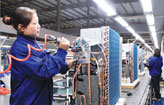
Thawing out
After a deep freeze in sales during the recession, China’s air conditioner makers are bouncing back
Preview of the coming issue
Cool Iron lady
Of good and evil
Specials
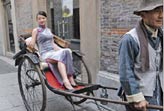
Memory lanes
Shanghai’s historic ALLEYS not just unique architecture but a way of life
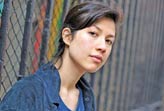
Great expectations
Hong Kong-born singer songwriter rises to the top of the UK pops.

A diplomat of character
Belgian envoy draws on personal fascination to help build China ties.
